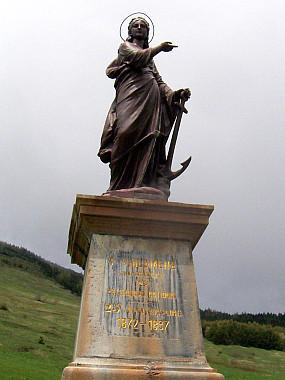
Rhone-Alps
La Salette
Following the Napoleon road (be careful if passing by "rampe de Laffrey") we can reach the small village of La Salette, near Corps, above which stands the sanctuary of pilgrimage to the Virgin Mary at an altitude of 1757 m (5765 feet).
From Corps, the 14 km (8.1 miles) winding road climbs more than 800 m (2625 feet)... The site is open from late March to early November.
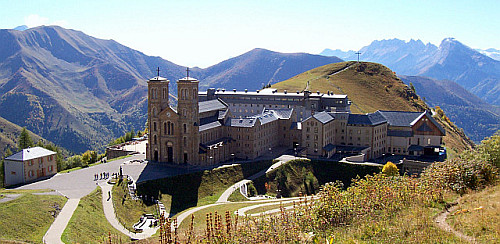
In 1846, the Virgin appeared to two children from Corps : Maximin Giraud, 11, and Melanie Calvat, 14, who were keeping their flocks.
The "beautiful lady", as the children first described her, appeared in a resplendent light and was clad in clothes of the region. The light from her forehead sparkled like a diadem and she wore a crown of roses. A heavy chain was hung on her shoulders and she wore another thinner chain around her neck where was hung a crucifix with a hammer on one side and pliers on the other side.
There are now statues at the place of the apparition.
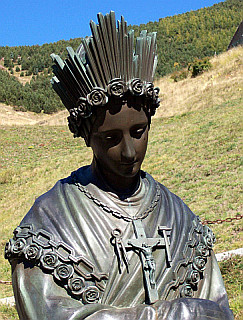
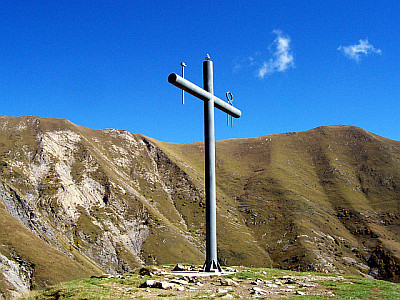
The Blessed Virgin could not stop crying all the time of her apparition and delivery of her message.
The Blessed Virgin began to speak in French :
"Come near, my children, be not afraid; I am here to tell you great news !"
"If my people will not submit, I shall be forced to let fall the arm of my Son. It is so strong, so heavy, that I can no longer withhold it."
"For how long a time do I suffer for you !"
"If I would not have my Son abandon you, I am compelled to pray to him without ceasing; and as to you, you take not heed of it. However much you pray, however much you do, you will never recompense the pains I have taken for you."
"Six days I have given you to labor, the seventh I had kept for myself; and they will not give it to me. It is this which makes the arm of my Son so heavy."
"Those who drive the carts cannot swear without introducing the name of my Son. These are the two things which makes the arm of my Son so heavy."
"If the harvest is spoilt, it is all on your account. I gave you warning last year with the potatoes but you did not heed it. On the contrary, when you found the potatoes spoilt, you swore, you took the name of my Son in vain. They will continue to decay, so that by Christmas there will be none left."
As Melanie did not understand the word "potato", the Virgin continued in the dialect of the region :
"Ah, my children, do you not understand ? Well, wait, I shall say it otherwise."
"Si la recolta se gasta nei rien qué per vous aoutres. Vous laiéou fa véire l'an passa per là truffà ..."
"Si ava de bla, foou pas lou semena..." etc...
"If you have wheat, it is no good to sow it; all you sow the insects will eat, and what comes up will fall into dust when you thresh it."
"There will come a great famine. Before the famine comes, the children under seven years of age will be seized with trembling and will die in the hands of those who hold them; the others will do penance by the famine. The walnuts will become bad, and the grapes will rot."
Then as she spoke to Maximin, Melanie heard nothing. Then when Mary talked to Melanie it was Maximin who heard nothing.
She continued for both :
"If they are converted, the stones and rocks will change into mounds of wheat, and the potatoes will be self-sown in the land."
"Do you say your prayers well, my children ?"
"Not much, Madam" meet the two children.
"Ah, my children, you must be sure to say them well morning and evening. When you cannot do better, say at least an Our Father and a Hail Mary. When you have time, say more."
"There are none who go to Mass except a few aged women. The rest work on Sunday all summer; then in the winter, when they know not what to do, they go to Mass only to mock at religion. During Lent, they go to the meat-market like dogs."
"Have you never seen wheat that is spoilt, my children ?"
"No, ma'am" they replied.
Then she spoke to Maximin :
"But you, my child, you must surely have seen some once when you were at the farm of Coin with your father. The owner of the field told your father to go and see his ruined wheat. You went together. You took two or three ears of wheat into your hands and rubbed them, and they fell to dust. Then you continued home. When you were still half and hour's distance from Corps, your father gave you a piece of bread and said to you : 'Here, my child, eat some bread this year at least; I don't know who will eat any next year, if the wheat goes on like that'."
Maximin replied :
"Oh yes, Madam, I remember now; just at this moment I did not remember."
The Beautiful Lady did not conclude in patois but in French :
"Well, my children, you will make this known to all my people"
After investigation and interrogation of the young shepherds, the apparition was given official approval and stated as "beyond doubt and for certain" by the Bishop of Grenoble in 1851. The Cure of Ars who met Maximin twice in 1850 doubted of it for several years before agreeing with it. Maximin said he never denied what he had said... So what did he tell the priest ? who knows !...
In front of the church, there is a way of the cross, a fountain, statues of the apparition, and hiking footpaths in the mountains. In the church there are beautiful stained glass windows, and murals from Arcabas, an artist of contemporary sacred art. Opposite the church on a hill, a large cross was erected with the symbols of the hammer and the pliers. The surrounding landscape is pleasant and quiet what makes it an ideal place to relax in finding spirituality, peace, serenity and nature.
Below, landscape during late autumn when the whole valley was shrouded in fog. One couldn’t see at more than 10 m on the road that climbed to the sanctuary but once there, what a sight and what a beautiful blue sky !
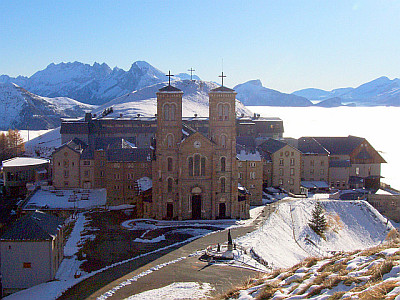
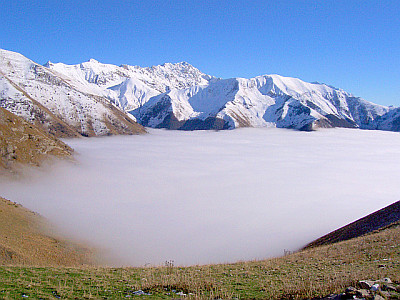
Note also the statue of St. Philomena near the entrance of the site. The base of the statue reads "St. Philomena, the inspirer of the national pilgrimage, 25th Anniversary 1872-1897." St. Philomena was prayed by the Holy Curé d'Ars who attributed to her many of his miracles. Little is known about her life. She died young (teenager) and as a martyr under the Roman persecution, perhaps under Diocletian. She is depicted with an anchor, which was a symbol of hope and steadfastness in faith in the early days of Christianity.
